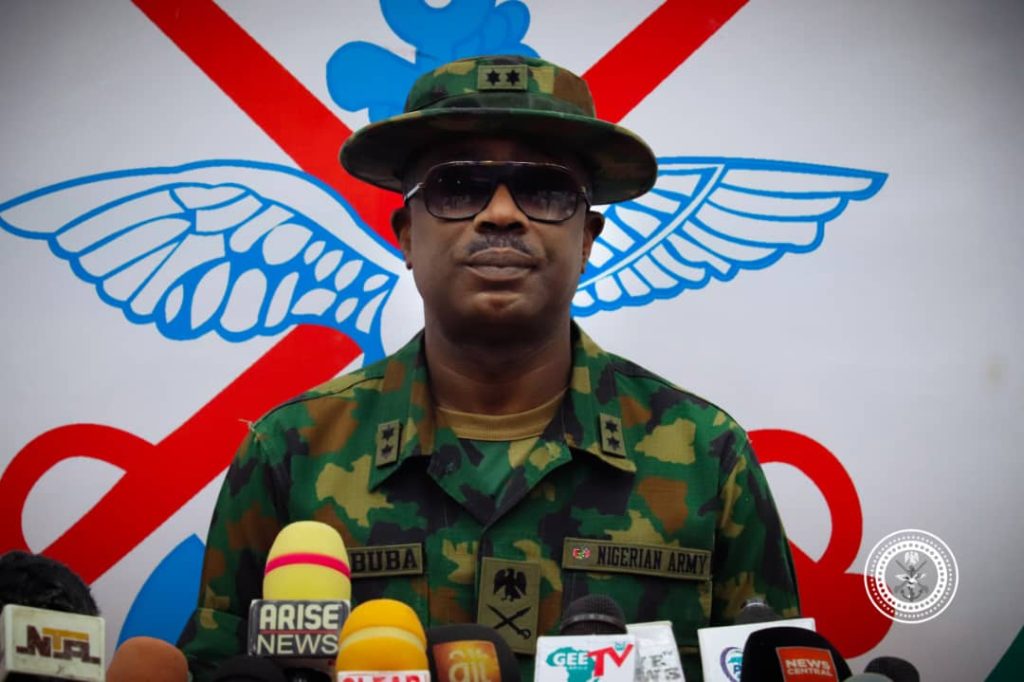Nigerian Troops Eliminate Over 100 Terrorists in Border Operation
Nigerian military eliminated over 100 terrorists in a recent air interdiction operation along the Niger-Zamfara border. Major-General Edward Buba, Director of Defence Media Operations, revealed this information during a press briefing at Defence Headquarters in Abuja.
Buba presented battle damage assessment images from the Nigerian Air Force’s air strikes, demonstrating the operation’s effectiveness. The military action also dealt significant blows to insurgent groups in other regions of Nigeria.
During the operation, troops seized 119 weapons of various types and 1,537 rounds of ammunition. This successful mission highlights the Nigerian military’s ongoing efforts to combat terrorism and banditry in the country.

Operation HADIN KAI Results in the Northeast:
- 39 Boko Haram/ISWAP terrorists neutralized
- 22 suspects arrested
- 18 hostages rescued
- Substantial weapons cache recovered
Operations Safe Haven and Whirl Stroke Results in the North Central:
- 12 terrorists neutralized
- 109 suspects arrested
- 22 kidnapped hostages rescued
- Multiple arms and ammunition recovered
Expanded Context and Analysis
Recent Military Operations in Nigeria
The Nigerian military has intensified its efforts against terrorist groups and bandits across the country. Operation Fansan Yamma, launched in Zamfara State, has been particularly effective in targeting bandit enclaves. On January 10, 2025, a coordinated air-ground assault on Fakai Hills resulted in significant casualties among bandits loyal to notorious leader Kachallah Bello Turji.
Air Force Capabilities and Regional Impact
The Nigerian Air Force (NAF) has been expanding its capabilities, aiming to become the third-largest air force in Africa by 2026. With 18,000 personnel and a growing fleet of combat-capable aircraft and unmanned aerial vehicles (UAVs), the NAF plays a crucial role in Nigeria’s security strategy.
The enhanced air power has implications beyond Nigeria’s borders. The NAF’s growing strength bolsters Nigeria’s ability to contribute to regional security initiatives and engage in diplomatic relations concerning security challenges in West Africa.
Challenges and Controversies
Despite its successes, military operations in Nigeria have faced challenges and controversies. In January 2025, an airstrike in Zamfara State tragically resulted in civilian casualties. The incident occurred when members of a local vigilante group were mistaken for fleeing bandits. This unfortunate event underscores the complexities and risks involved in counter-terrorism operations in densely populated areas.
The Nigerian Air Force has committed to thoroughly investigating such incidents and improving its protocols to minimize civilian casualties. These efforts are crucial for maintaining public trust and support for military operations.
Regional Security Landscape
West Africa, particularly the Sahel region, has become a new epicenter for terrorism. Nigeria’s military operations are part of a broader regional effort to combat this threat. The country’s expanding air force capabilities are seen as a strategic asset in addressing security challenges across the region.
Impact on Local Communities
The ongoing military operations have had a significant impact on local communities in affected areas. While many celebrate the successes against terrorist groups and bandits, others grapple with the consequences of prolonged conflict. The liberation of kidnapped victims and the destruction of terrorist hideouts have brought relief to many families and communities.
Future Outlook
As Nigeria continues to strengthen its military capabilities, particularly its air force, the country is poised to play an increasingly important role in regional security. The focus on air power reflects a strategic shift in combating terrorism and addressing security challenges in difficult terrain.
However, the military must balance its operational effectiveness with the need to protect civilian lives. Improving intelligence gathering, enhancing coordination between air and ground forces, and engaging with local communities will be crucial in achieving this balance.
In conclusion, while recent military operations have yielded significant results against terrorist groups and bandits, they also highlight the complex challenges facing Nigeria’s security forces. As the country continues to adapt its strategies and capabilities, the focus on minimizing civilian casualties and addressing the root causes of insecurity will be paramount for long-term success.

